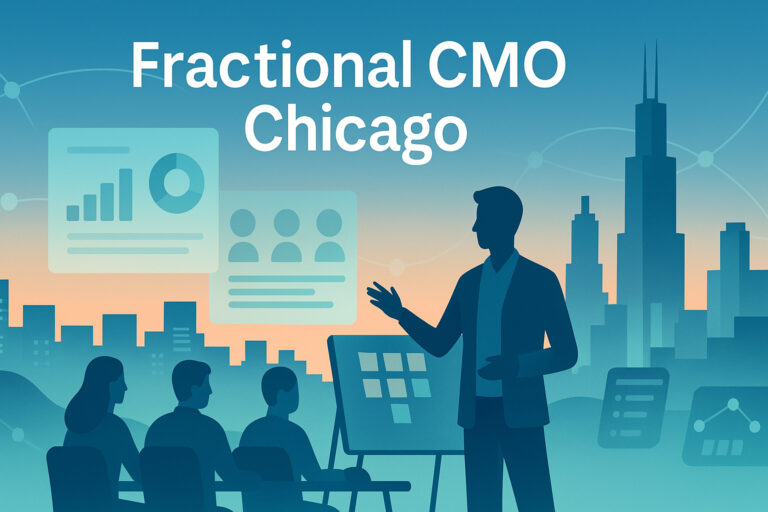Launching a startup is a sprint through chaos—founders juggle product development, hiring, fundraising, and sales, often while marketing gets handled reactively or left in limbo. The result? Wasted ad spend, inconsistent messaging, stalled lead flow, or—worse—no real go-to-market strategy at all.
Most early-stage companies can’t afford a full-time Chief Marketing Officer, nor do they always need one. What they do need is a senior-level marketing strategy, guidance, and execution—but only when and where it counts.
That’s where fractional CMOs come in.
Fractional CMO companies for startups provide high-level marketing leadership on a part-time or project basis. They give executive-caliber strategy minus the full-time price tag—whether that means refining positioning, accelerating lead gen, building out a marketing team, or preparing for Series A.
Below is a list of ten of the top fractional CMO firms for startups—each offering a unique approach, industry specialization, or value model. Whether you’re pre-revenue or scaling fast, there’s a solution here tailored for you.
1. GrowTal
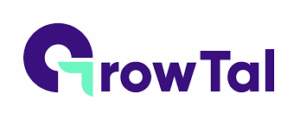
At GrowTal, we’ve built our model around one clear idea: high-growth companies shouldn’t have to choose between speed and experience. Our interim CMOs are ready to step in fast, but they bring the kind of strategic depth you’d expect from full-time leadership. Whether you’re preparing for a product launch, refining your go-to-market strategy, or deciding where your next dollar should go, we connect you with GrowTal marketing experts who’ve done this before—and know how to do it well.
We’re not a general marketplace. Every CMO in our network has been carefully vetted by people who’ve led marketing teams themselves and know how to boost brand impact with an interim CMO. Because we’ve been in these roles—at Facebook, at scaling startups, at complex digital orgs—we know what matters. We ask better questions, we look for more than just credentials, and we only recommend professionals we’d trust to run marketing in our own company.
We also give our experts access to enterprise-level tools and direct support, including platform relationships that allow them to move faster and operate at a level most freelancers can’t. The result: you get leadership that’s not only strategic but immediately productive. If you’re looking for an interim CMO who can actually execute, we’re here to help make that match.
- HQ: Los Angeles, CA
- Founded: 2019
- Website: growtal.com
- Email: team@growtal.com
2. NoGood
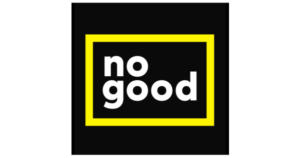
For early-stage companies that need to grow quickly but lack in-house marketing leadership, NoGood offers a practical solution. They provide fractional CMOs who work alongside startup teams to shape strategy, prioritize channels, and coordinate execution. The approach is hands-on—these aren’t consultants dropping slide decks and disappearing. They stay involved, helping guide decisions and align the work with growth goals.
NoGood focuses heavily on measurable outcomes. Their team works across paid media, content, SEO, and conversion optimization, but everything ties back to performance—reducing acquisition costs, increasing qualified leads, and making marketing spending accountable. They’ve worked with companies in SaaS, AI, fintech, and health tech, often stepping in during periods of aggressive scaling or market entry.
- HQ: New York, NY (SoHo), with teams in Los Angeles and Miami
- Founded: 2016
- Website: nogood.io
- Email: hello@nogood.io
3. Authentic Brand

Not every startup needs a CMO in the room five days a week—but having one in the loop at the right moments can make the difference between reactive marketing and a cohesive, forward-looking strategy. Authentic Brand works with companies that want that kind of leadership without committing to a full-time hire.
Their model is structured and deliberate. Rather than contracting freelancers or temporary execs, Authentic Brand employs their fractional CMOs as W‑2 staff. Each is paired with clients through a careful matching process, supported by an internal framework called Authentic Growth™, which helps guide strategy across brand positioning, team development, and channel planning. The result is a steady hand on the marketing wheel—particularly valuable for founder-led teams navigating early growth or preparing for scale.
- HQ: Minneapolis, MN
- Founded: 2017
- Website: authenticbrand.com
- Email: https://authenticbrand.com/contact/
4. Digital Authority Partners

For startups entering regulated or technically complex markets—like healthcare, finance, or enterprise software—marketing isn’t just about visibility; it’s about clarity, compliance, and building trust. Digital Authority Partners (DAP) approaches fractional CMO work with that in mind, combining strategy with subject-matter depth and execution capability.
Their model pairs senior marketing leaders—often with Fortune 500 or agency backgrounds—with a full digital support team. That allows early-stage companies to not only define positioning and build a marketing roadmap but also implement campaigns without assembling a team from scratch. DAP tends to work well with startups preparing for funding rounds or major product launches, especially when messaging needs to align with both technical buyers and broader markets.
- HQ: Chicago, IL and San Diego, CA
- Founded: 2017
- Website: digitalauthority.me
- Email: hello@digitalauthority.me
5. Marketri

Startups in B2B industries often face a different marketing challenge than consumer-facing brands. It’s less about chasing attention and more about building long-term trust, navigating longer sales cycles, and aligning closely with business development goals. Marketri focuses squarely on this space, offering fractional CMO leadership designed for high-stakes, complex environments.
Rather than approaching marketing as a collection of disconnected tactics, Marketri works through a framework that ties strategy to revenue outcomes. Their M³ model is designed to integrate long-term planning with execution across content, demand generation, analytics, and internal team development. This makes them a particularly strong fit for financial services, private equity, and industrial firms where accountability, structure, and clear reporting aren’t optional.
- HQ: Philadelphia, PA
- Founded: 2004
- Website: marketri.com
- Email: dandrews@marketri.com
6. The Marketing Blender

When sales and marketing feel disconnected, even the best startup ideas can stall. The Marketing Blender works with B2B companies—especially in SaaS and technical industries—to tighten that gap. Their fractional CMOs focus on aligning messaging, lead generation, and sales enablement into a single, consistent motion.
Rather than jumping straight into channel tactics, Blender starts with positioning and clarity: Who are you really selling to? What do they care about? How are you showing up in-market? From there, they help founders prioritize the right tools and timelines without overengineering the process. The team emphasizes pragmatism and revenue alignment, making them a useful partner for early-growth companies trying to professionalize their marketing without losing momentum.
- HQ: Dallas–Fort Worth, TX
- Founded: ~2018
- Website: themarketingblender.com
- Email: Dacia@themarketingblender.com
7. CMOx
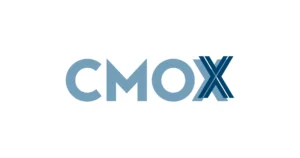
CMOx works with startups that need structure more than scale—companies where marketing isn’t chaotic but simply underdeveloped. Their fractional CMOs help define what to do, when to do it, and how to track it—without asking founders to build a marketing department from scratch.
Their approach is particularly well-suited to industries where clear processes matter: health, fitness, manufacturing, and B2B tech. These are environments where guesswork is expensive and where marketing has to justify itself with real results. CMOx leans into this with a repeatable model: strategic planning, execution sequencing, and performance tracking—all designed to give early-stage companies a roadmap they can actually follow.
- HQ: Remote (U.S.-based)
- Founded: ~2019
- Website: cmox.co
- Email: grow@cmox.co
8. Chief Outsiders

For startups that are starting to resemble mid-sized companies—whether by headcount, revenue, or investor expectations—fractional leadership needs to look and act like enterprise leadership. Chief Outsiders is built with that scale in mind. With over 120 fractional CMOs and CSOs in its network, the firm operates more like a collective than a typical agency.
The key differentiator here is breadth. Rather than assigning a single generalist, Chief Outsiders can match companies with marketing leaders who’ve worked in their exact sector, stage, or business model. They also bring a structured engagement process supported by their GrowthGears™ framework, which balances strategic clarity, operational systems, and demand generation. For startups navigating growth inflection points—especially those backed by private equity—this level of fit and specialization can be a strong advantage.
- HQ: Houston, TX (with regional offices across the U.S.)
- Founded: 2009
- Website: chiefoutsiders.com
- Email: https://www.chiefoutsiders.com/contact-us
9. Imprint Digital
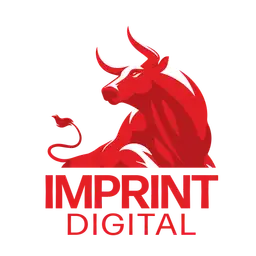
Imprint Digital offers a straightforward model: pair a fractional CMO with a ready-to-go team that can execute across key digital functions. That means startups don’t just get strategy—they get campaigns launched, websites updated, ads optimized, and metrics tracked, all through one coordinated structure.
This setup is particularly useful for companies that are still hiring or experimenting with channel mix. Instead of managing multiple contractors or agency relationships, founders can rely on Imprint to handle both planning and delivery. The model favors speed and cohesion, which makes it a good fit for startups looking to gain traction without overextending internally.
- HQ: Colorado, USA
- Founded: ~2018
- Website: imprint-digital.com
- Email: needtoknow@imprint-digital.com
10. Kalungi

Kalungi works exclusively with B2B SaaS companies, which gives it a narrower focus than most fractional CMO providers—and a deeper playbook. Rather than adapting general strategies to fit software startups, their team builds everything around SaaS-specific needs: long sales cycles, product-led growth, recurring revenue models, and investor expectations.
They combine strategic leadership with execution support, but what stands out is how structured their process is. Kalungi offers clearly defined engagement stages—from brand development to demand generation to pipeline acceleration—mapped against a startup’s maturity and goals. It’s a service built not just to offer advice but to build out full marketing functions that can be handed off or scaled internally over time.
- HQ: Seattle, WA
- Founded: 2018
- Website: kalungi.com
- Email: contact@kalungi.com
Conclusion
Finding the right fractional CMO for startups isn’t just about filling a gap—it’s about bringing in leadership that can guide growth with focus and clarity. Each of the companies listed here offers a different approach, whether you’re looking for strategic oversight, full execution support, or something in between. The key is knowing what your startup needs most right now—and choosing a partner who can deliver at that stage. With the right fit, a fractional CMO isn’t a temporary fix; it’s a catalyst for building real, sustainable momentum.
FAQs
How much should a fractional CMO charge?
Rates typically range from $5,000 to $15,000 per month, depending on experience, scope, and time commitment. Some charge hourly or project-based fees, but monthly retainers are the most common model.
Is a fractional CMO worth it?
For startups that need strategic marketing leadership but can’t justify a full-time executive, a fractional CMO can offer strong ROI. They bring senior-level guidance without the long-term cost or hiring complexity.
Does a startup need a CMO?
Not always—but once marketing decisions start affecting growth, investor confidence, or team clarity, having a CMO (even part-time) becomes valuable. It’s less about title and more about having the right level of leadership at the right moment.
What is fractional CTO for startups?
A fractional CTO is a part-time or contract-based technology leader who helps guide product development, architecture, and tech strategy. They’re often brought in when a startup needs senior engineering direction but isn’t ready for a full-time CTO hire.

